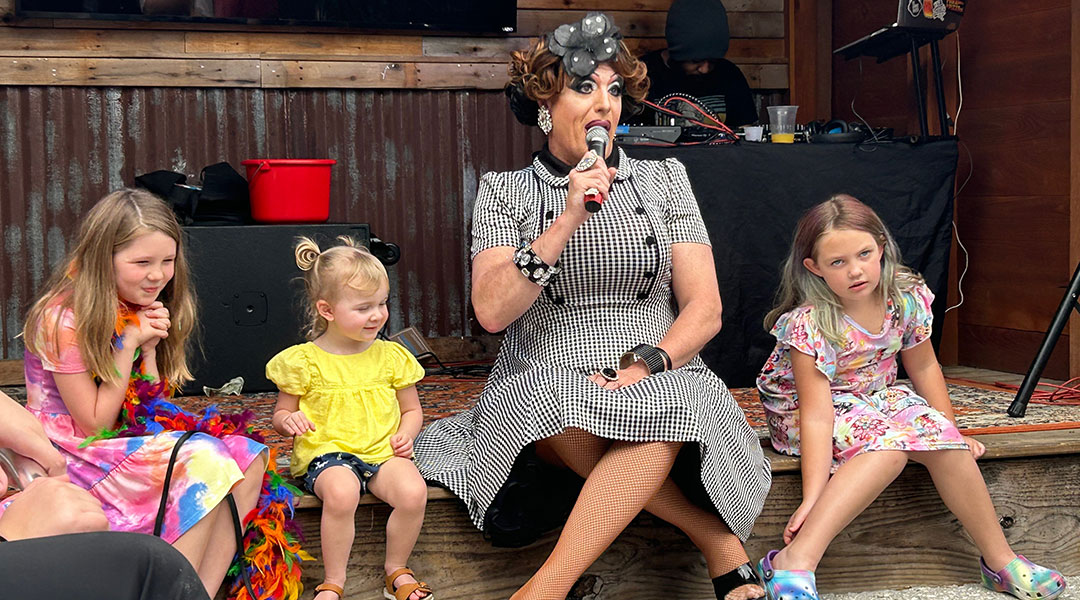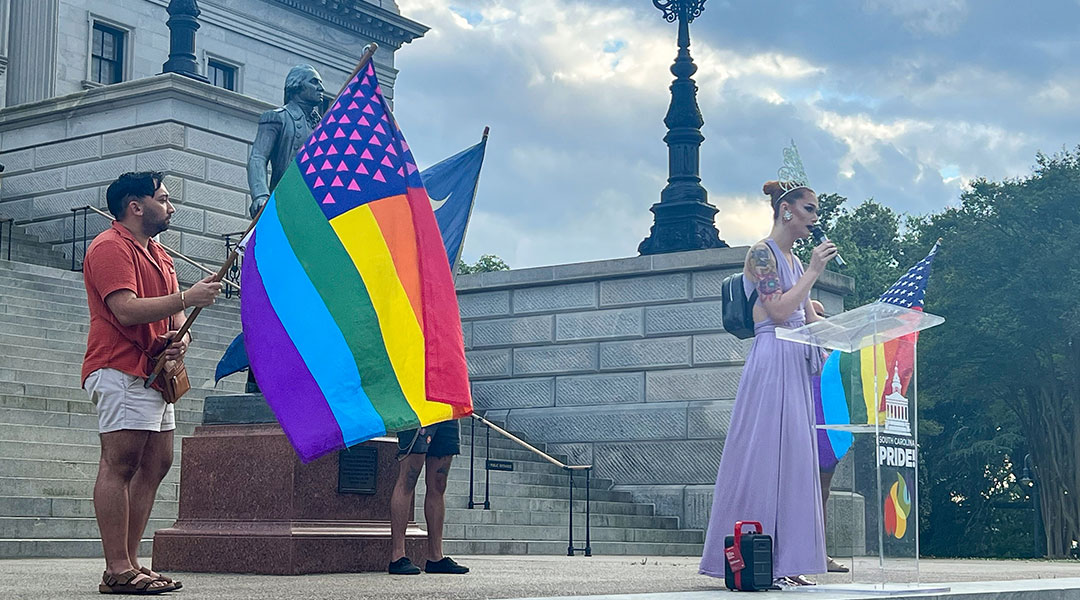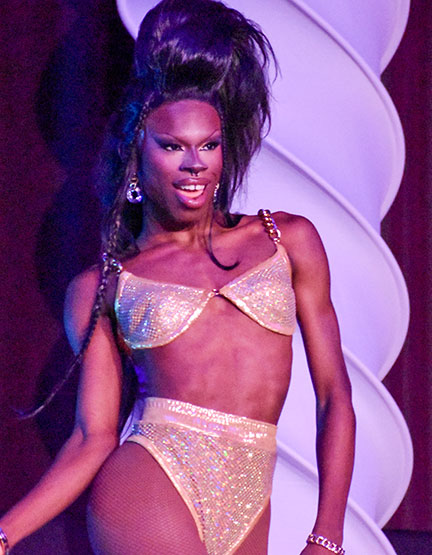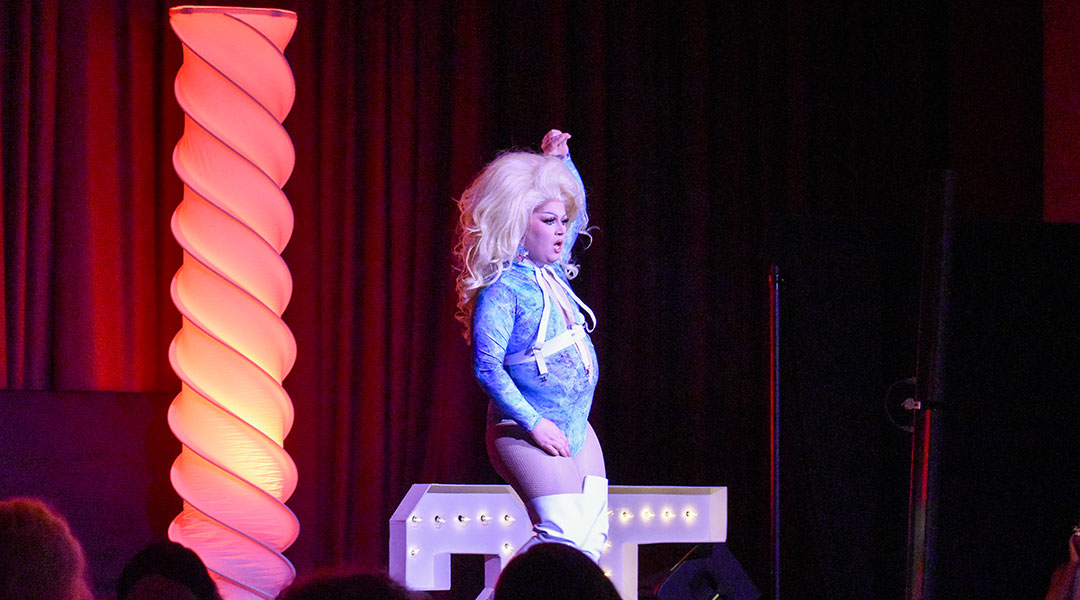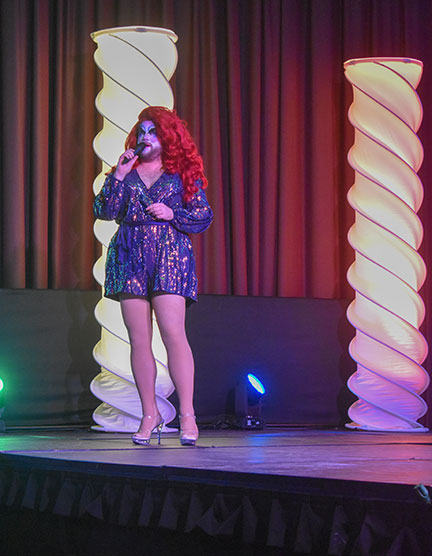Patti O’Furniture is a drag queen who performs in the Carolinas. Here, she is joined by young girls during a show in Charleston. She said she asked the girls what made them happy and their responses were love, family and glitter. (Photo courtesy of Patti O’Furniture)
Proposed legislation would prohibit state funds from being used to host drag shows, and businesses that host a drag performer would be deemed sexually oriented and have to follow additional rules.
The Defense of Children’s Innocence Act is pending in the House of Representatives’ Judiciary Committee.
The LGBTQ+ community is worried about the impact this bill could have on both drag queens and the rest of the community, said James Agens, vice president of Columbia’s Famously Hot S.C. Pride.
“I’m terrified, and the reason I say that is because there’s a lot of people this affects,” Agens said. “It doesn’t affect me the same way as (it would) a queen. But I cannot imagine having people that I consider family being affected or being harmed, or even being targeted.”
Agens said his group is working to bring awareness and visibility to those the bill would affect the most.
“Specifically, the impacts it has on people as people,” he said. “Our entire purpose as an organization is to bring visibility to the LGBTQ community.”
In addition to addressing drag shows, the bill, H. 3616, includes a wide range of measures to protect children, said Rep. Jordan Pace, R-Berkeley, a sponsor of the bill.
For example, the bill would create a criminal offense for allowing a minor to view a drag show.
“We don’t want to see kids brought in strip clubs,” Pace said. “I think that should cause an outcry if people were doing that. In the same way that we don’t want to see kids brought to adult performances regardless of their gender or whoever the performer is.”
The bill was introduced in the House on Jan. 11, 2023 and it has eight sponsors.
Another sponsor, Rep. Josiah Magnuson, R-Spartanburg, thinks the bill is another step the state can take to protect minors from being sexualized.
“Exposing kids to sexually explicit content is perverted and obscene,” he said in an email. “Until about five minutes ago, everyone in America agreed. But today we are seeing an unprecedented push by the far Left to normalize the sexualization of children, even trying to use our libraries and schools to do so.”
Businesses aren’t the only hosts of drag shows.
The University of South Carolina has hosted an annual drag performance, Birdcage, for 25 years. The free show is put on by Carolina Productions and IRIS, also known as Individuals Respecting Identities and Sexualities.
While Carolina Productions is primarily funded by student tuition fees, it still receives state funds through the Office of Student Affairs.
D’Asia White, a student and president of Carolina Productions, worries the bill could change the way the organization serves students.
“The mission of Carolina Productions is to put on events for students, by students, and I always like to add all students,” White said. “It provides them entertainment regardless of identity. If this passes, we wouldn’t be able to serve all students like we’ve been doing for the past 25 years.”
It’s uncertain if the passing of this bill would cancel specific LGBTQ+ programs and events.
The university’s Student Affairs Office did not wish to comment.
Drag queens have performed at universities across the state. One of the most recognizable is Columbia’s Patti O’Furniture, who has been performing for nearly 25 years in the Carolinas.
One of her worries is the diversity that would be taken away from college campuses.
“I immediately got a mental image of a giant jigsaw puzzle with a huge piece missing,” she said. “You wouldn’t see the whole picture. One of the most transformative things about college, about education in general, is exposing people to different perspectives where we have to think and wonder.”
Drag isn’t just a symbol in the LGBTQ+ community – drag advocates for every area of oppression, said Terrance Henderson, equity advisor to Trustus Theatre in Columbia and a drag queen.
“There’s so much healing that happens at performances,” Henderson said. “Drag queens are on the front lines in terms of how we heal people. There are people who have come out of illness and through sickness and through poverty and … those wounds are healed through these kinds of events and performances.”
O’Furniture has raised $1.5 million in tips and every dollar has gone to support more than 100 charities. Others do the same.
“I decided that I would use the character Patti to raise money for local organizations that I believed in,” she said. “That’s sort of been the key part of my drag identity. Whenever I perform on stage, any tips that I make, I donate back to charity.”
But some businesses depend on revenue from drag shows.
The Venue, a Columbia piano bar and lounge, hosts a weekly drag brunch.
Garett Bright has worked with The Venue for eight months. He has seen crowd after crowd attend the weekly brunch.
“We typically see almost 80% to a fully packed-out house every Sunday,” Bright said.
Bright and O’Furniture think several businesses would have to change their practices to sustain the economic hit if the bill becomes law.
The Venue has no intention to change what it does, and redefining themselves as a sexually oriented business to host drag shows is not out of the question, Bright said.
“It’s a simple performance, and to change our business strategy around one performance may not be the wisest decision,” he said. “But at the same time, we will consider our options if it comes to that.”
While businesses will face a possible economic loss, drag queens themselves are at risk of losing their income.
O’Furniture, an adjunct professor at Midlands Technical College, said most of her income is from her performances at both universities and privately owned businesses.
She said she doesn’t think restaurants and bars would go to the trouble of registering as a sexually oriented business if the law passes.
“All of the drag entertainers in the state are going to lose out on that revenue and that income,” she said.
Pace said the performers’ profession is a choice.
“I would argue that’s not the state’s responsibility” to help compensate performers for that lost income, Pace said.
O’Furniture is asking lawmakers to remember why the United States was founded.
“This country was founded on freedoms and choices,” she said. “I think that we should all be free to make educated choices.”
Famously Hot S.C. Pride held a rally April 16 to bring attention to the bill. Several activists spoke at the rally, including drag queens from across the Southeast. (Photo courtesy of James Agens)
Luxx Noir London gained her fame from competing on RuPaul’s Drag Race reality TV show. She headlined this year’s Birdcage event at USC. (Photo by Emily Okon)
Birdcage hosted 17 drag queens this year, with the event space at full capacity. Birdcage is free for all students. (Photo by Emily Okon)
Drag queens are known for lip-syncing and dancing, but some specialize in stand-up comedy. (Photo by Emily Okon)

